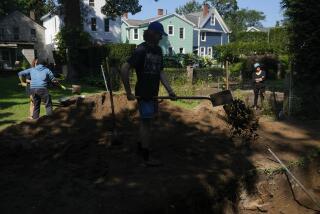Black Genealogists Get Help Tracing Their Roots
- Share via
Toni Scott packed the remnants of her family history into a plastic grocery bag -- dozens of tattered and sepia-toned photographs of mostly strangers, passed on to her by her deceased grandmother. With care, she pulled her baby book out of the bag and gently opened the brittle pages to show off her family tree.
“Except for the name of his mother, my father’s side of the tree is empty,” said the 58-year-old Los Angeles special education teacher. “I’m here today to find out how to fill in the blanks.”
Scott was among about 500 who gathered for the African American Family History Conference, sponsored by two black genealogical societies and the Church of Jesus Christ of Latter-day Saints. Participants came from as far away as San Diego, some with little more than a grandmother’s name to launch a search, others seeking information to break through a frustrating obstacle to complete their history.
“I’ve hit a total brick wall,” said Milton Hines, 73, who for two years has been trying to identify his great-great-grandmother. His is a roadblock common to black genealogists, who are often uncertain about surnames because as family members were sold, they often would take on their new owner’s name.
Through oral histories and record searches, Hines, a past president of the San Diego chapter of the African American Genealogy Society, found out that at age 13, his great-grandmother, Louisa Hines, was separated from her mother in Memphis and took on the Hines surname of her owner. He believes his great-great-grandmother was sold to an Arkansas slave owner, but does not know who it was.
“She could have taken the name of another slave owner,” he said. His challenge now involves the painstaking task of trying to identify, using only their first names, slaves who were sold at the same time as Hines, in the hope of finding possible linkages.
Hines said he first became interested in his family history after the death of his first wife. “And then Alex Haley came along and that really set me off,” he said, referring to the author of the novel “Roots,” which became the basis of a landmark 1977 TV miniseries.
Throughout the day, participants listened to lively and fact-laden lectures from Mormon genealogists on issues ranging from “Everything You Ever Wanted to Know About Tombstones,” to “Photo Retouching Basics.” The Church of Jesus Christ of Latter-day Saints has long been a leader in genealogical research, because of its teaching that families are eternal and will be united in heaven.
“In order for families to be together forever, you need to know who they are,” said Marvin Perkins, director of African American relations for the Southern California Public Affairs Council of the church. The conference at a Mormon chapel near USC was part of the church’s outreach effort to African Americans, opening to them expansive genealogy libraries called Family History Centers. The day was all about information, not proselytizing.
“The most valuable thing we can give people today is direction on where they can get help,” Perkins said. Participants were given a binder thick with resource information, from how to research African American military experience to African American bank records.
Indeed, the obsession with family roots bound the participants Saturday. They swapped stories about how a military record led to a breakthrough, or how a misspelled name on a U.S. census record stymied the completion of a family tree. Each person seemed to have a burning unanswered question about the past that had led him or her to be the family sleuth.
“Ever since I was a kid, I wanted to know about my family and why everyone in the town I grew up in called each other cousins, aunts and uncles,” said Glennie Hines, who met her husband Milton while conducting genealogy research. “Turns out we genuinely were all cousins.”
One of the most popular sessions gave participants a hands-on computer demonstration on how to use records from the Freedman’s Savings & Trust Co., a post-Civil War institution that recorded the names of 480,000 black depositors and their kin. The Mormon church took on the task of putting the information onto a CD-ROM, an 11-year project.
Many participants, like Grover Walker, were just starting their searches. As parents aged, as relatives moved and passed on, he said, he feared his family legacy would be lost.
“I have cousins in their 90s and I’m trying to get their oral histories,” said Walker, a Los Angeles attorney. “A family is identity. It gives you a sense of purpose, of belonging. It lets you know what you should be about, especially if you know how your forebears accomplished great things in difficult times.”
More to Read
Sign up for Essential California
The most important California stories and recommendations in your inbox every morning.
You may occasionally receive promotional content from the Los Angeles Times.













